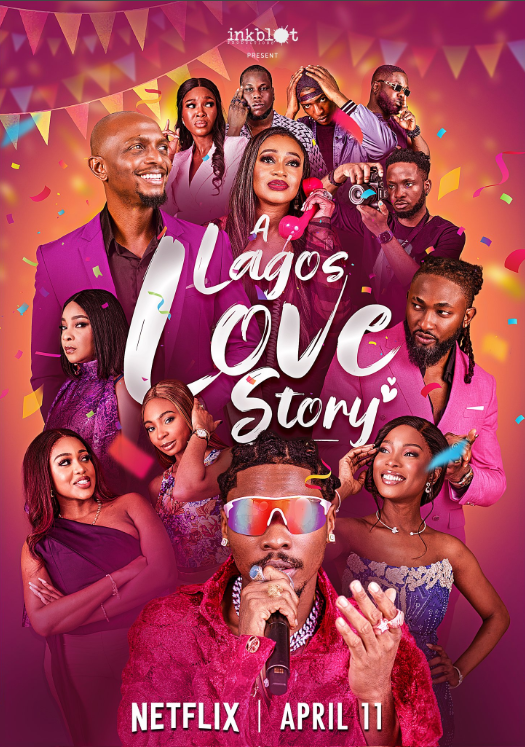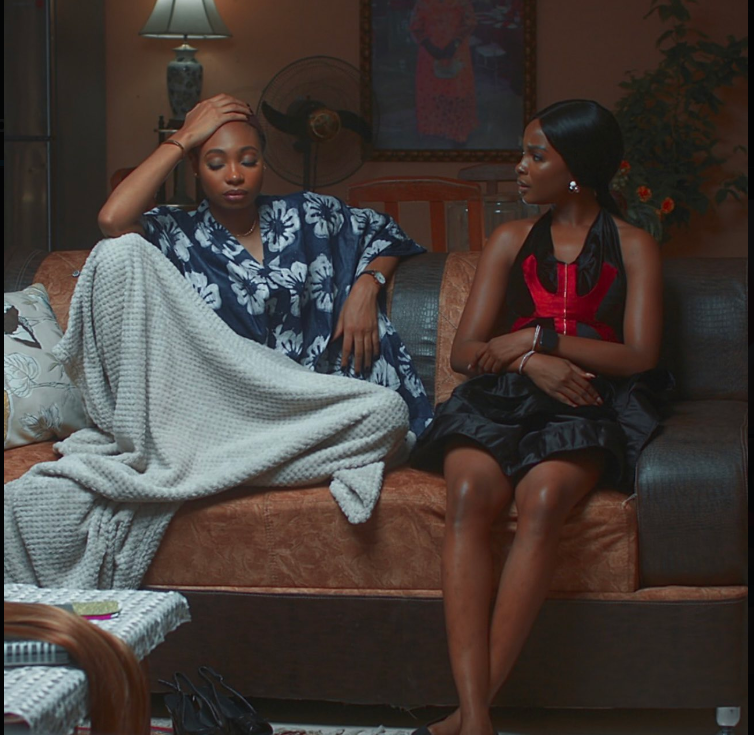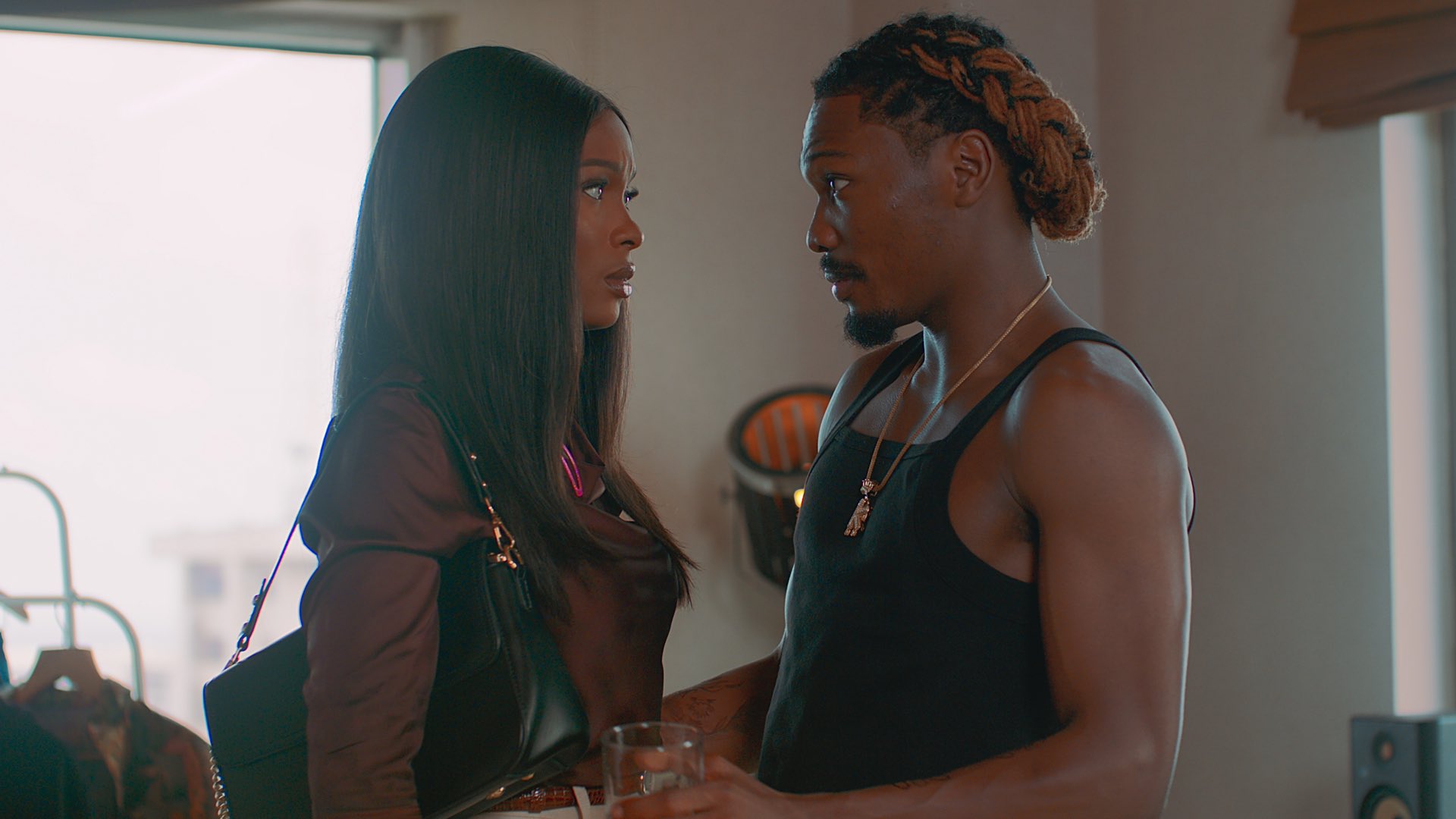Regrettably, A Lagos Love Story fails to tell a convincing love story or even spark any real romance between its romantic leads.
By Vivian Nneka Nwajiaku
Inkblot Production’s new straight-to-Netflix film, A Lagos Love Story (2025), partly inspired by Ayra Starr’s 2024 song, “Lagos Love Story”, blesses us with romantic leads that should and can be a sight for sore eyes.
The movie stars are Mike Afolarin and Jemima Osunde, youngish actors who have led Inkblot projects before, fish-out-of-water dramas where romance is not the primary focus but does take up space as a side attraction.
Think Osunde as a young woman who discovers that she’s the heir of a wealthy business tycoon who’s recently passed away in New Money (2018) and Afolarin as a poor boy who gets a scholarship to attend an elite school in Far From Home (2022).
In A Lagos Love Story, Inkblot pairs them as a romantic duo, and they’re both stunning individuals who look great together. But fine leads alone do not make a romance film.
The romance has to actually be written in, not merely willed into existence, which is what happens in A Lagos Love Story, directed by Inkblot’s co-founder, Chinaza “Naz” Onuzo (The Set Up 2 (2022); The Perfect Arrangement (2022)), from a screenplay he co-wrote with Ozzy Etomi, her first screenplay for a film.
Afolarin stars as an Asake-style Afrobeats star, from the signature dreadlocks (although Asake has now let go of that) to the wide, toothy smile. He goes by King Kator—birth name Kazeem Toriola—comes from a lower middle class background, and hides his education for the sake of street credibility.
Osunde plays Promise Quest, an event planner pursuing a contract for an art and culture festival in Lagos. With her family apparently indebted to the government in millions, her father (Kalu Ikeagwu) incapacitated from a work-related health condition, and the government about to seize the house that holds her late mother’s memories, Promise can really use her earnings from the contract to turn things around.

After she fails to impress her potential employer, Fadekemi Rhodes (Linda Ejiofor), on the first try, a run-in with King Kator at an exclusive party impresses Fadekemi’s boss, Achike Ezeoma (IK Osakioduwa), earning Promise a second chance. But to secure the contract, she has to prove herself capable by acting as a concierge to King Kator for four days, a job so thankless that it feels like four weeks instead.
Still, A Lagos Love Story promises that sparks will fly, that the brash King Kator and the stern Promise Quest will find themselves falling in love before those four days are over. But do they, really? Or are we just expected to believe they do?
It is more than a valid expectation to watch the lovebirds of a romance drama actually fall in love. But A Lagos Love Story takes the concept too formulaically, running through classic romance tropes one-by-one, from the leads literally falling into each other to the leads falling apart over a discovery that one was paid to date the other, without stirring up the romance that makes those tropes work in the classics where they do.
It’s almost as if someone wrote a list of romance tropes and kept ticking away until the list was exhausted. Meet-cute, check. Let’s make them two meet-cutes, check. Better still, let the meet-cutes have the leads falling and bumping into each other, check check.
A fashion shop/costume test trope, check. Grand entrance, check. Fake dating, double check. Big reveal about fake dating, check. Surprise kiss, why not? Walk of shame, sure. Grand gesture, yes please. Declaration of love, check, of course.
But A Lagos Love Story fails to build an actual love story around those tropes, sometimes even undermining them, as if afraid of being cringey, when the undermining makes the tropes cringey, anyway.
One frustrating instance unfolds in the fashion shop scene, where Promise has to go through the famous motions of trying on outfits for an occasion with Kator. Her reaction is not one of awkwardness or bashfulness or even discomfort at the ethics of the circumstance, but one of contempt for the circumstance in itself, like she despises the very idea of having to deal with Kator. She even kisses her teeth, what Nigerians call a “hiss”, a proper I-hate-it-here hiss.
Earlier in the film, when Promise and her Afrobeats star were still being unfriendly to each other, annoyance at having to dress up as his date to an event would have made sense. But at forty-six minutes in, when they have fully crossed the line into friends, at least, and Kator has very much warmed up to her to the extent of giving in to her demands without drama, her annoyance feels misplaced and uncharacteristic.
Unsurprisingly, her onscreen audience is confused. Well, so are we. And when the scene is followed by a grand entrance trope that it immediately undercuts again with drama, the only reasonable reaction from a lover of the genre is that I-hate-it-here hiss.

There’s even a throwaway moment where an interviewer asks King Kator if there will be any special ladies in the audience at his concert—and absolutely nothing is done with it. Instead, Promise sits at the other end of the room, talking to a tax officer on the phone. The scene cuts immediately after the question is asked, and it simply never comes up again.
The result is that the so-called love story being sold feels unnatural, and characters don’t sound like they mean what they say. Not even the other characters in A Lagos Love Story seem to be buying it, with everybody around the couple shooting them weird looks for most of the film.
It’s almost funny, maybe the only thing funny in this movie, how the people closest to them keep rolling their eyes, from Promise’s sister, Favour (Susan Pwajok), to Kator’s manager, Mayowa (Uti Nwachukwu). Some would say that they are merely cringing at the romance brewing; maybe that’s the intention, but without romantic tension, it just does not translate that way on the screen.
Kator and Promise do cross into friendlier terrain, but A Lagos Love Story never commits to crossing the line from friendly to romantic, not storywise—one sweet scene with some banter at a local eatery (that is again interrupted) and one weird chivalrous moment at a dinner party (also reduced to drama) are not enough to tip the scale towards romance—and definitely not visually.
Afolarin gives a good audition for an Asake biopic and Osunde for a strict big sister who’s also a softie, but neither of them is pulling off a real lover here. To be clear, two gorgeous leads looking good together is not equal to chemistry.
In fact, when that surprise kiss happens, the lack of chemistry and build-up makes it creepier than it is romantic. And it’s made worse by the power dynamic at play between the duo.
For a film that is interested, even if superficially, in the problem of power dynamics in cross-class relationships (for instance, between Achike and Kator, and between Favour and Adanna, a wealthy minister’s daughter immaculately played by Uche Montana), A Lagos Love Story misses the problem of its own portrayal of power dynamics in workplace romantic relationships.
On one hand are Fadekemi and Achike, a pair that is teased as some sort of power couple even though the latter is the former’s boss and routinely compromises her authority at work. On the other are Kator and Promise, with the latter’s job perpetually hanging in the balance.

Until that first kiss, and even in the moments that immediately follow, there is no indication that their relationship feels even slightly like more than just a job to Promise, and Kator’s cooperation is essential to her scoring the contract that she desperately needs, especially considering the weight of the influence he has over her job—which A Lagos Love Story seems to think is cute, because he wields it to her benefit, as if he cannot as easily do the opposite.
What is interesting is that the power dynamic between Kator and Promise, if properly utilised, would have made more impact as the main conflict than all that drama that the film leans into in its bid to force Promise and Kator into decisions that fit the screenplay’s penchant for chaos and aids their description as characters with a talent for disaster.
All that time spent on disasters could have been better spent on the leading couple truly exploring each other. Regrettably, A Lagos Love Story barely bothers with that and so fails to tell a convincing love story or even spark any real romance between its romantic leads.
The premise may hint at a classic romp about falling in love with a superstar in Lagos, but A Lagos Love Story turns out to be a forgettable, uncharismatic experience that lacks the heart and scope of the Afro-Pop song that inspired its title. If this is falling in love, it does not seem very enjoyable.
Rating: 2.3/5
(A Lagos Love Story is streaming on Netflix)
Vivian Nneka Nwajiaku is a writer, film critic, TV lover, and occasional storyteller writing from Lagos. She has a master’s degree in law but spends most of her time reading about and discussing films and TV shows. She’s particularly concerned about what art has to say about society’s relationship with women. Connect with her on Twitter @Nneka_Viv




